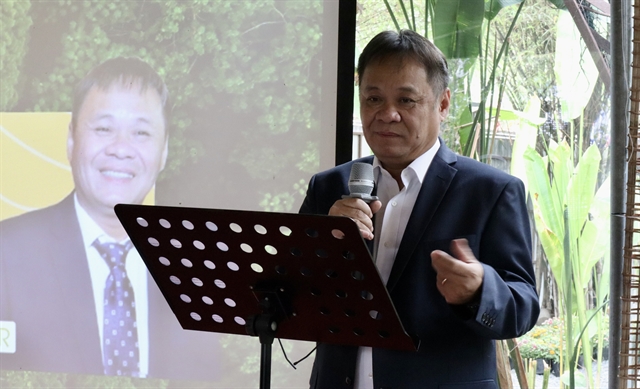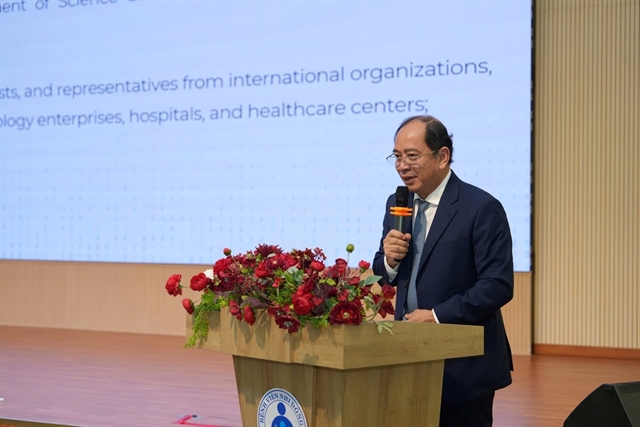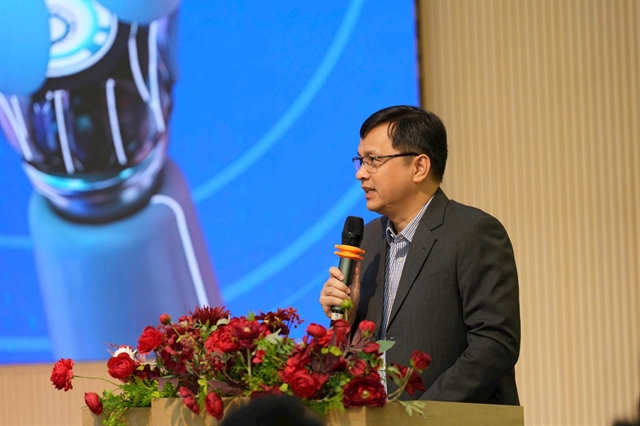 Economy
Economy
.jpg)

|
| Associate Professor, Dr. Tăng Chí Thuợng, director of the HCM City Department of Health, said HCM City’s health sector has identified AI as one of the core drivers in building a modern, intelligent, and patient-centred healthcare system. — Photo courtesy of ictvietnam.vn |
HCM CITY — Artificial intelligence (AI) is profoundly reshaping healthcare systems, from supporting clinical decisions and analysing medical images to enabling personalised treatments and optimising hospital operations.
Associate Professor, Dr. Tăng Chí Thuợng, director of the HCM City Department of Health, highlighted these developments at the AI in Health Conference 2025 organised by the department and the HCM City Computer Association (HCA), in collaboration with Nim & Partners Communication and other partners in HCM City on May 23.
The conference aimed to explore the potential and impact of AI on Việt Nam’s healthcare landscape, with a focus on developing a "Smart Healthcare" system in HCM City. Over 700 attendees participated, including government officials, medical professionals, technology experts, and business leaders.
Thượng emphasised that “The city’s health sector has identified AI as one of the core drivers in building a modern, intelligent, and patient-centred healthcare system.”
“The city has incorporated AI into its Smart Healthcare Strategy for the 2021–2025 period, with a vision toward 2030, and is currently applying AI across numerous hospitals and specialised centres,” he said.
“We do not see AI as a replacement for healthcare professionals, but rather as an intelligent assistant that can enhance clinical quality, personalise care, streamline workflows, and improve patient experiences,” he added.
He also stressed the importance of digital transformation, particularly through the implementation of Electronic Medical Records (EMRs) and the development of an intelligent emergency medical dispatch system. These are foundational elements of smart healthcare, yet remain challenging for many hospitals.
Dr. Thượng expressed appreciation that the conference featured sessions dedicated to crucial topics, highlighting that insights from international experts could help identify feasible and practical pathways for digital transformation.

|
| Lâm Nguyễn Hải Long, chairman of the HCM City Computer Association, speaks at the AI in Health Conference 2025 in HCM City on May 23. — Photo courtesy of ictvietnam.vn |
According to Lâm Nguyễn Hải Long, chairman of HCA, AI is increasingly used in healthcare for a wide range of applications: analysing medical imaging data, detecting early signs of illness, supporting robotic surgeries, managing medical records, offering remote patient care through chatbots, and predicting disease outbreaks using population data.
“These applications help expand access to healthcare services across all social strata and regions, especially in areas with limited human resources and infrastructure,” he said.
In her keynote presentation, Dr. Angela Pratt, World Health Organization (WHO) Representative in Việt Nam, highlighted both the opportunities and the risks associated with AI in healthcare. She said that digital technologies, including AI, would hold the potential to revolutionise 21st-century healthcare.
"AI is already being used in Việt Nam to analyse diagnostic indicators and optimise treatment plans for cancer patients. Robotic surgery is also gaining ground, helping hospitals deliver more precise, minimally invasive procedures," she noted.
However, she warned that these advancements must be handled responsibly.
“Like all new technology, AI holds enormous potential for improving the health of millions of people around the world, but like all technology it can also be misused and cause harm,” she said, quoting WHO Director-General Dr. Tedros Adhanom Ghebreyesus.
She spoke about two major risks. The first is equity gaps. Unequal access to digital tools can widen health disparities, especially in areas with low digital literacy or internet access.
She recommended enhancing digital literacy and ensuring that AI tools reach those who need them most, transforming challenges into opportunities to improve public health.
The second risk is data privacy and cybersecurity. AI systems rely on vast amounts of sensitive personal health data. Strong privacy and cybersecurity measures are critical to build trust in digital health systems.
To fully harness AI’s benefits while managing its risks, WHO recommends six core principles for governments and health leaders.
They are building trust (ensuring transparency in AI system development and use), applying risk-based oversight tailored to the level of risk posed by different AI applications, ensuring inclusive and secure data management, keeping health professionals in decision-making roles, integrating data system, and promoting multilateral cooperation to ensure equitable and ethical adoption of AI.
The conference also featured presentations on the latest AI technologies and trends in diagnostics, treatment, hospital administration, and public health. Discussion panels addressed ethical concerns, legal challenges, and the practicalities of implementing AI in Việt Nam’s healthcare environment.
Long said the conference WAS expected to become an annual, large-scale, and professional forum. It would serve as a platform for experts, policymakers, and businesses to exchange knowledge and contribute to the advancement of a smart healthcare system in Việt Nam. — VNS